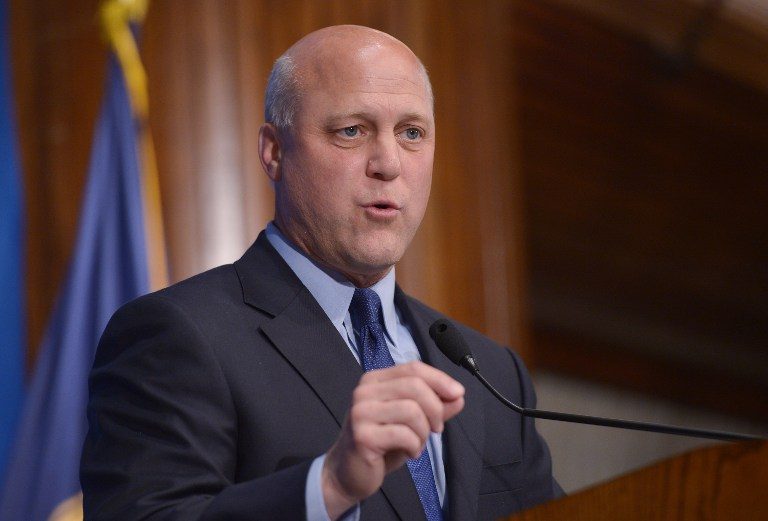SUMMARY
This is AI generated summarization, which may have errors. For context, always refer to the full article.

WASHINGTON DC, USA – The mayor of New Orleans expressed confidence Tuesday, August 18, in his city’s ability to weather an equally mighty storm, a decade after it was savagely devastated by Hurricane Katrina.
“The city is much safer than it was in terms of hurricane protection,” Mayor Mitch Landrieu told a National Press Club luncheon in Washington.
Some $14.6 billion in federal funds have gone toward reinforcing the levees that failed spectacularly when Katrina slammed into New Orleans on August 29, 2005, he said.
More than 1,800 people were killed, and one million others displaced, with Katrina packing winds of up to 175 miles (280 kilometers) per hour.
It stands as the most devastating and costliest natural disaster in US history.
“If another event came in just like this one, at the same speed and the same time, we have really good reason to believe that we would be fine,” Landrieu said.
“You can’t ever guarantee that you’re not going to get hurt, but today New Orleans is much better prepared and we’re much stronger.”
Eighty percent of New Orleans found itself under water when the levees that surround it broke, laying the historic Louisiana city to watery waste.
Total property damage attributed to Katrina in Louisiana and neighboring states have added up to $135 billion, the federal Department of Housing and Urban Development (HUD) said.
Landrieu’s upbeat tone stood in contrast to a report in the New Orleans Times-Picayune in which engineers and scientists described the rebuilt levee system as inadequate.
Built for 100-year storms
The levees – overseen by the US Army Corps of Engineers – have been rebuilt to withstand a so-called “100-year flood event,” making homes and businesses eligible for federal flood insurance.
But such was the force of Katrina that its surges bore the force of a rarer, yet bigger and more potent 200-year storm event, the newspaper said.
At a news media briefing, HUD said it had allocated nearly $20 billion post-Katrina towards the long-term recovery of housing stock and infrastructure in Louisiana and neighboring states.
Louisiana alone has gone through $1.6 billion to build new schools and colleges, health care facilities, parks, water and sewer projects and coastal fisheries.
Another $14 billion in HUD recovery funds went to support state-run housing programs in Louisiana, Mississippi, Texas, Alabama and Florida.
“The road to recovery has been long and not without serious challenges,” HUD Secretary Julian Castro said in a statement.
“But it’s also shown that though the storm was strong, the resilient spirit of the Gulf Coast was even stronger,” he said.
“And as long as there are people who want to come home and communities that need to be rebuilt, our job is not done.”
Landrieu, 55, talked up New Orleans’s “resilience,” calling it “America’s comeback city” and an example of what other major US cities can do in confronting seemingly insurmountable challenges.
Lots of optimism
Citing a public opinion poll released last week by NPR public radio and the Kaiser Family Foundation, he said “a whopping 78% of residents are optimistic about New Orleans’ future.”
“New Orleans is on a roll,” said Landrieu, a Democrat who was lieutenant governor of Louisiana when Katrina struck, and whose father Moon Landrieu was mayor of the city for most of the 1970s.
That said, Landrieu frankly acknowledged a host of nagging problems deeply rooted in New Orleans’s pre-Katrina past, from rampant crime to poor schools and stark racial disparity.
He particularly lamented the disproportionate rate of homicides among young black men throughout the United States, calling it “a national disgrace.”
“Stopping murder should be a national priority. Black lives matter,” he said to applause from the largely white and well-heeled audience. – Robert Macpherson, AFP / Rappler.com
Add a comment
How does this make you feel?
There are no comments yet. Add your comment to start the conversation.